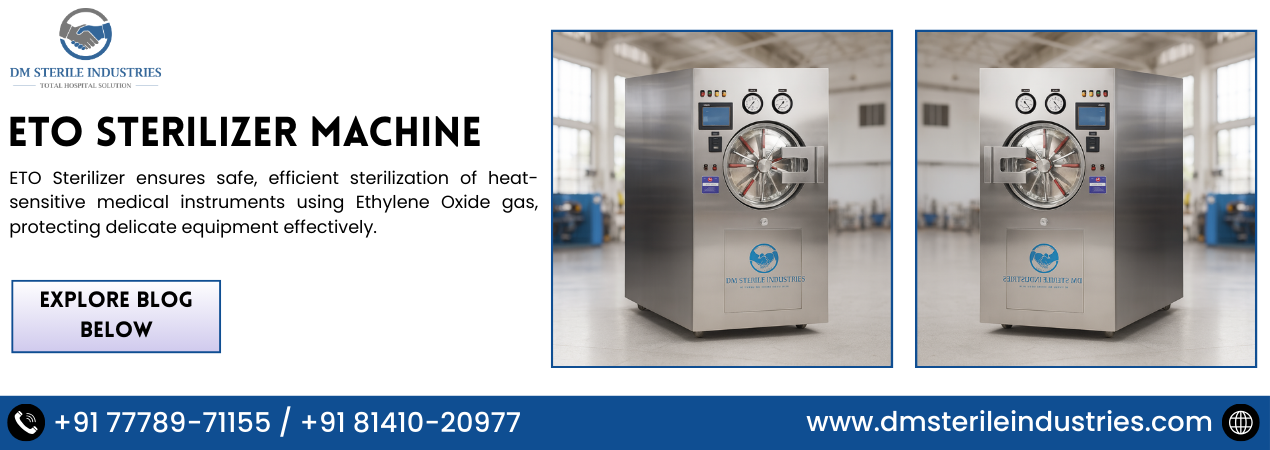Horizontal Cylindrical Autoclave
Introduction to Horizontal Cylindrical Autoclave
A Horizontal Cylindrical Autoclave is a robust sterilization device primarily used in hospitals, laboratories, and pharmaceutical industries to sterilize medical instruments, glassware, and other heat-resistant materials. Operating on the principle of high-pressure saturated steam, it effectively kills all microbial life, including bacteria, viruses, fungi, and spores. Its horizontal orientation is designed to accommodate larger volumes and bulk loads, making it a cornerstone of infection control and hygiene in institutional settings. Manufactured with durable stainless steel, these autoclaves are built for reliability, efficiency, and safety, ensuring consistently sterile outcomes for critical applications.
Working Principle and Sterilization Cycle for a Horizontal Cylindrical Autoclave
The sterilization process in a Horizontal Cylindrical Autoclave is based on the principle that saturated steam at high pressure and temperature (typically 121°C or 134°C) can penetrate materials and denature proteins of microorganisms, leading to their destruction. The typical cycle begins with loading the items to be sterilized. The chamber is then sealed and a vacuum is created to remove all air, ensuring full steam penetration. Steam is then injected to reach the desired pressure and temperature for a specific hold time. Finally, the steam is released, and a drying phase follows, leaving the sterilized items ready for use. This systematic process guarantees a high level of sterility assurance.
Types of Autoclaves and Sterilizers
- Horizontal Cylindrical Autoclave :- Ideal for large-scale sterilization of surgical instruments, dressings, and lab equipment in hospitals.
- Vertical Autoclave :- A space-saving design suitable for smaller labs and clinics, used to sterilize lab media and glassware.
- Table Top Autoclave :- Compact and portable, often used in dental clinics and small medical practices for quick instrument sterilization.
- High-Pressure Steam Sterilizer :- A general term for autoclaves that use high-pressure steam for efficient and complete sterilization.
- ETO (Ethylene Oxide) Sterilizer :- Utilizes gas for low-temperature sterilization of heat-sensitive and delicate instruments.
Key Features and Specifications of a Horizontal Cylindrical Autoclave
- Double-Walled Construction :- The inner chamber and outer jacket are made of stainless steel to handle high pressure and ensure durability.
- Automated Digital Control Panel :- Allows for precise setting and monitoring of temperature, pressure, and sterilization time with pre-programmed cycles.
- Pressure and Temperature Gauges :- Provides real-time readouts to monitor the sterilization process and ensure it meets safety standards.
- Safety Mechanisms :- Includes safety valves, pressure interlock systems, and alarm indicators to prevent accidental opening and ensure operator safety.
Applications of Horizontal Cylindrical Autoclave
- In hospitals and medical centers, they are used to sterilize surgical instruments, linen, dressings, and other hospital equipment to maintain a sterile environment and prevent hospital-acquired infections.
- Microbiology and research laboratories rely on them to sterilize lab glassware, media, culture tubes, and biohazardous waste, ensuring experiments are not contaminated and labs remain safe.
- The pharmaceutical industry employs these autoclaves to sterilize production equipment, containers, and certain raw materials, adhering to strict hygiene standards for drug manufacturing.
- They are also used in veterinary clinics and research facilities to sterilize surgical tools and equipment for animal care, ensuring patient safety and effective infection control.
Benefits of the Horizontal Cylindrical Autoclave
- High Capacity: Its horizontal design allows for the sterilization of large, bulky items and multiple trays simultaneously, making it highly efficient for institutional use.
- Superior Sterilization: High-pressure saturated steam effectively penetrates even hard-to-reach areas of instruments, guaranteeing the destruction of all forms of microbial life.
- Durability and Longevity: Constructed from high-grade stainless steel, these autoclaves are corrosion-resistant and built to withstand frequent use in demanding environments.
- Operational Safety: Equipped with advanced safety features, including pressure locks and over-temperature protection, ensuring safe operation for technicians and staff.
Manufacturers & Suppliers in India
India is home to numerous manufacturers and suppliers specializing in medical and laboratory equipment, including horizontal cylindrical autoclaves. Reputable companies such as DM Sterile Industries, Krishna Engineering, and Sterility Equipment India offer a wide range of models known for their robust design, advanced technology, and compliance with national and international quality standards. These firms provide comprehensive solutions for hospitals, research labs, and pharmaceutical companies across the country, ensuring access to reliable sterilization technology.
Maintenance and Safety Tips
- Always use distilled or deionized water to prevent scale buildup in the chamber, which can affect sterilization efficiency and damage the heating elements.
- Regularly check and clean the chamber, drain screen, and gaskets to ensure a proper seal and prevent clogs.
- Do not overload the autoclave. Ensure adequate space between items to allow for proper steam circulation and penetration.
- Perform routine calibration of pressure gauges and temperature sensors to ensure accurate sterilization cycles.
- Conduct regular biological indicator tests to verify that the autoclave is consistently achieving sterilization efficacy.
FAQs – Horizontal Cylindrical Autoclave
Contact Details
Talk to our specialists today for tailored solutions and fast assistance.

